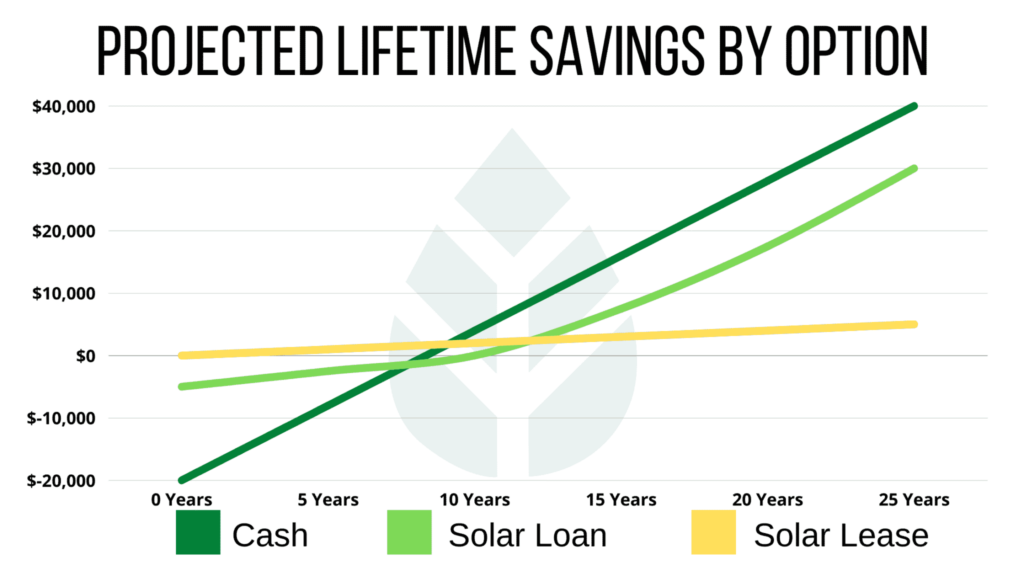3 Things Your Solar Panel Company Won’t Tell You

 Why you can trust us
Why you can trust us
Founded in 2005 as an Ohio-based environmental newspaper, EcoWatch is a digital platform dedicated to publishing quality, science-based content on environmental issues, causes, and solutions.
As residential solar increases in popularity, so does the prevalence of inexperienced solar companies.
When solar companies cut corners, you suffer. Poor customer service, misleading warranties or uneducated salespeople can quickly turn your solar installation process sour.
While there are plenty of reputable solar companies out there, staying informed can help you avoid scams and find a company with the necessary experience and expertise to ensure a reliable investment.
Here are the top three things that your solar panel company won’t tell you, but are crucial to know:
1. Avoid Leasing Your Solar Panels
If you’re leasing your solar panels, chances are you’re assuming more risk than you think.
The truth is, leasing solar panels is cheaper upfront because you’re passing off most of the benefits of going solar to your solar company.
Leasing solar panels is not necessarily a scam, but your return on investment will be lower and you will not own the solar panels on your home.
For starters, when you lease your solar panels, you don’t get to claim the 30% federal tax credit on your solar system. You’re allowing the solar company to claim it instead.
Leased solar panels also don’t increase the value of your home like ones that you own will. In fact, if you’re selling your home, some potential homebuyers may be scared away by the idea of making payments on an existing solar lease.
That means that, when you sign a solar lease, your solar company takes advantage of solar rebates, incentives and tax credits while you assume the payments and risk.
Your annual lease payment isn’t locked in either. Your payment will increase by 2% to 5% each year until your lease expires, meaning you’ll pay more for your lease each year. Canceling your lease early will also incur high fees.

Takeaway: If you’re set on a solar lease, always read the fine print of your solar agreement. Is there a cancellation fee? What happens if you move? Buying or financing your solar panels is almost always a wiser choice than leasing them.
2. Do Your Research and Hire Solar Experts
Solar energy seems simple enough — your panels convert sunlight into electricity that powers your home. But in reality, solar is far more complex than that.
Solar arrays with batteries, microinverters, EV chargers or other accessories only add to a solar system’s complexity, and they’re not exactly user-friendly.
Doing your own research and speaking with well-educated solar contractors and salespeople can help you understand the nuances of solar panels and avoid damaging or misusing your equipment.
For instance, during the public outages following Hurricane Ida, some New Orleanians didn’t know that a completely drained Tesla Powerwall needs to be rebooted. A reboot requires electricity from the power grid, which isn’t very useful during a power outage.
Instead, to charge a solar battery using solar panels, you can only use as much battery power in one cycle as its depth of discharge (DoD) allows. For most solar batteries with a DoD around 90%, you have to start recharging it before it reaches 10% or less of battery power.1
Knowing the ins and outs of solar technology helps you choose the most efficient solar system and use your equipment correctly.
That’s why hiring a solar company with outstanding customer service and technical expertise is extremely important. If you have questions or concerns about your solar panels, it will be difficult or impossible to get answers if your salesperson has no technical knowledge about how solar systems work.
Takeaway: Always do your research! An uneducated salesperson may be unable to explain what you really need to know about your solar panels, leading to trouble down the road.
3. Always Read the Fine Print
We’ve all been there — a company sticks around to take your money, but once an issue arises, they’re nowhere to be found.
Considering how expensive and complex solar panels are, you don’t want to be left high and dry. Promises of a long-term, comprehensive solar warranty are great, but that warranty is useless if your solar company doesn’t follow through.
That’s why you should always read the fine print of your contract and warranty.
For starters, it’s important to know what your solar warranty covers. Standard solar product warranties protect you against equipment failure and defects, but not underperformance.
A performance solar warranty is separate from a standard equipment warranty. The performance warranty will guarantee that your solar panels operate at a certain level of their capacity as long as the warranty lasts.
The best solar warranties last 25 years and cover the solar materials, workmanship and performance. Always ask your solar contractor about the details of your warranty coverage before you sign any contracts. Here’s what we recommend as a minimum for warranty coverage:
- Solar panel product warranty: At least 10 years
- Solar panel performance warranty: 25 years (covered by solar panel brand)
- Workmanship warranty: At least 10 years
- Inverter warranty: At least five years
One crucial detail about solar warranties — if your solar provider goes out of business, your warranty will be voided.
Takeaway: Always do your research and hire a solar company with at least five years in the business. Learning about solar may take time, but it’s worth it.
Subscribe to get exclusive updates in our daily newsletter!
By signing up, you agree to the Terms of Use and Privacy Policy & to receive electronic communications from EcoWatch Media Group, which may include marketing promotions, advertisements and sponsored content.

 233k
233k  41k
41k  Subscribe
Subscribe 




